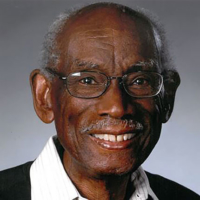
The UCLA Award for Community Service was awarded to Wilfred “Bill” Coggins MSW ’55.
Meyer and Renee Luskin, namesakes and major benefactors of the Luskin School of Public Affairs, have been recognized as the 2020 Edward A. Dickson Alumni of the Year, UCLA’s highest alumni honor.
The university’s Alumni Association also honored Wilfred “Bill” Coggins MSW ’55 with this year’s UCLA Award for Community Service, which recognizes alumni who have worked for the enrichment of others and the betterment of their communities.
The Luskins are entrepreneurs, philanthropists and lifelong friends of UCLA.
“Together, Renee and Meyer have shaped UCLA’s greatness for nine decades, transforming UCLA through their many gifts benefiting students, families, communities and institutions around the globe,” the Alumni Association said in announcing the award.
Meyer Luskin earned a bachelor’s degree in economics in 1949, then went on to launch Scope Industries, which recycles bakery waste to make an ingredient in animal feed. Renee Luskin earned a bachelor’s degree in sociology in 1953.
“The Luskins have transformed their success with an extraordinary generosity of spirit and resources to help UCLA impact countless lives,” the association said.
In 2019, the Luskins were awarded the UCLA Medal, the university’s highest honor. At a reception at the university conference center bearing their name, Chancellor Gene Block said, “What drives Meyer and Renee is precisely what drives UCLA: a desire to solve society’s biggest challenges and to create opportunity for all through education and research.”
Coggins was honored for his decades of stewardship of the Kaiser Permanente Watts Counseling and Learning Center, which helps families achieve academic and personal success, the Alumni Association said.
Amid the unrest of 1960s Los Angeles, Kaiser Permanente hired Coggins, an Army veteran, Fulbright scholar and psychiatric social worker, to develop a program that would meet the social and emotional needs of the Watts neighborhood.
“Coggins established trust with the community to create an organization that serves as an essential mental health and educational resource,” the association said.
“Bill Coggins has been called the heart and soul of the center, which continues to thrive due to his creative and thoughtful leadership that benefited generations of Watts residents,” it said.
Coggins, who retired as the center’s executive director in 1998, has been inducted into the California Social Work Hall of Distinction. In 2018, he became the first recipient of the UCLA Luskin Social Welfare Lifetime Achievement Award.
The UCLA Alumni Awards have recognized distinguished Bruins since 1946. This year’s honorees were announced in the spring; a celebration of their achievements will be planned at a later date.
Read more about the 2020 UCLA Alumni Awards.

